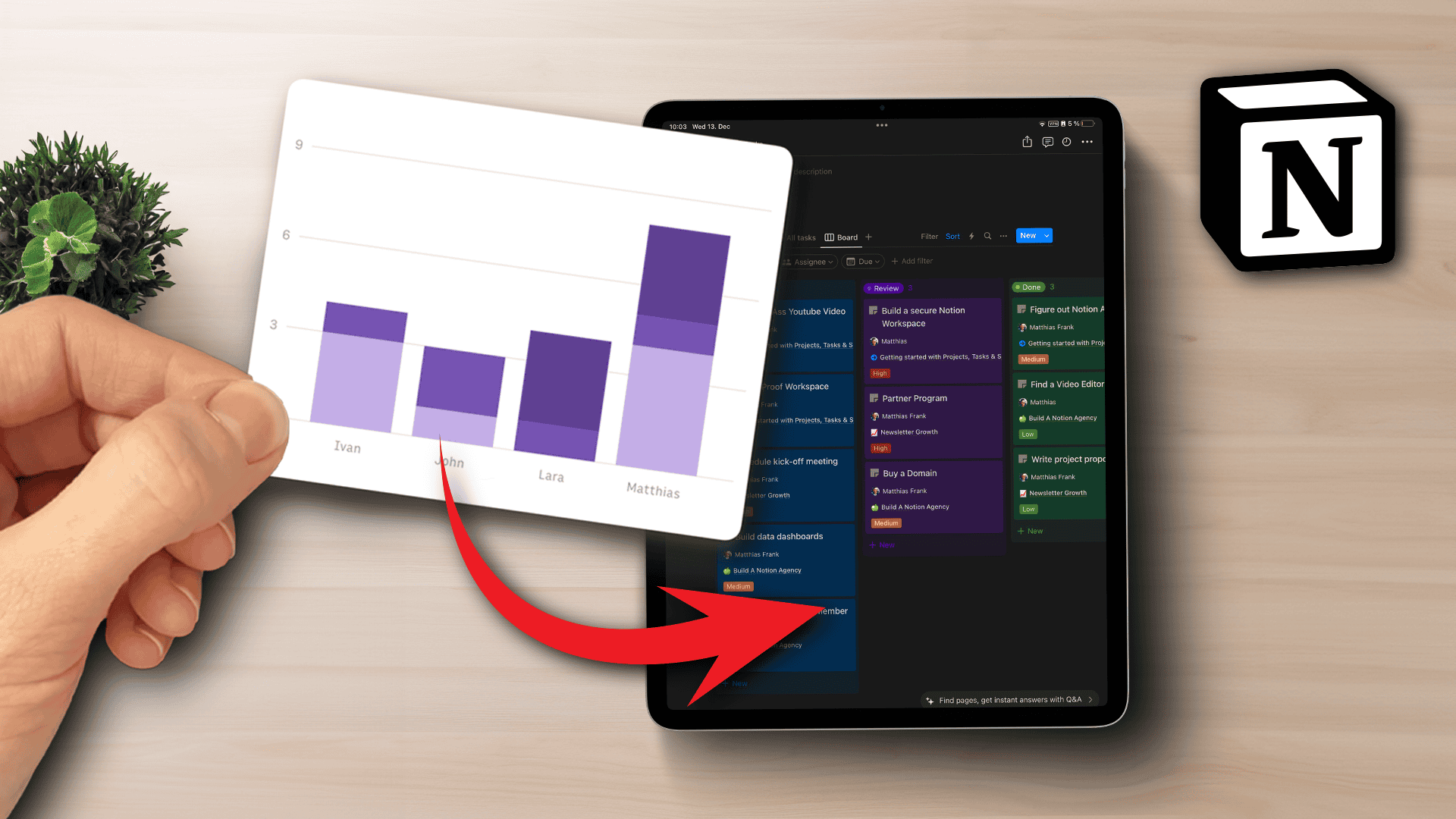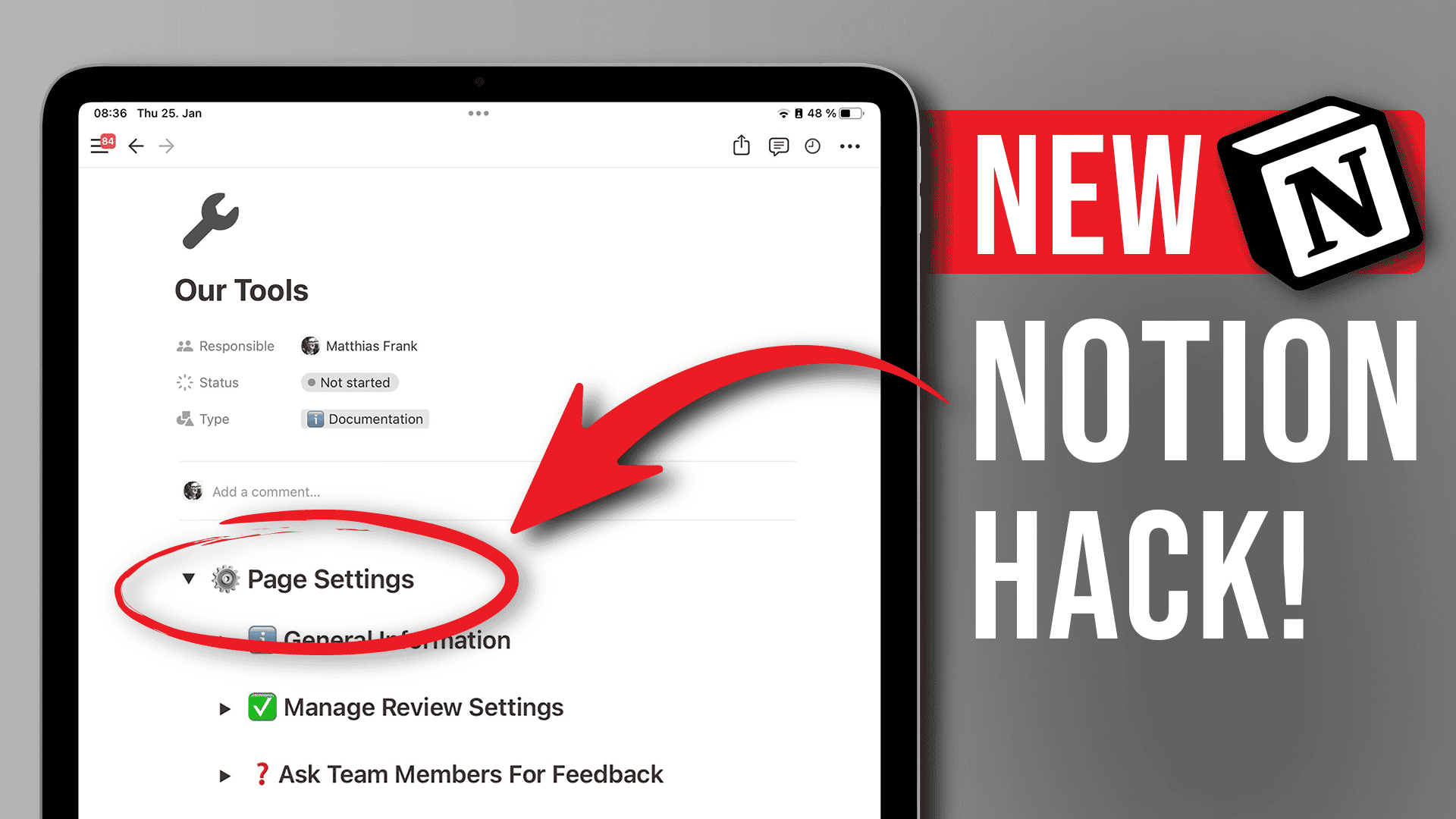If you are serious about accelerating your Personal Growth, then you definitely should do a Personal Annual Review. It’s one of those exercises where it’s really hard to put into words just how good and impactful it is. Let’s try it anyway: if you spend 3 hours of your year on an Annual Review, then I’m 100% certain that this will be your highest leverage activity all year long. So what’s a Yearly Review all about? And how can we conduct our Personal Annual Review in Notion? Let’s find out.
What is a Personal Annual Review?
Put simply, a personal annual review is you spending some time to pause and reflect on the past year. It starts with something as simple as “What happened in January?” and might evolve into more complex and challenging questions like “What made me come alive?”.
It’s not just a trip down memory lane. During a Yearly Review, you take stock of where you are, how you have changed in the past year, identify the trajectory you’re on and try to figure out: where do you want to go from now.
Plus, it’s an incredibly helpful exercise to make sure that your good resolutions this year finally last longer than Januar 19th.
Why should you do a Personal Annual Review?
My two dear friends Sokrates and Carl Jung have some strong opinions on this, so I let them talk first:
“The unexamined life is not worth living” – Sokrates
“Until you make the unconscious conscious, it will direct your life and you will call it fate” – Carl Jung
Or to put it in slightly less extreme terms: if you never pause to look at where you are right now and where you are going, then all the improvements that you’re chasing – being more productive, finally getting that promotion or simply earning more money – might just lead you to the wrong place, faster.
Here are a few more reasons why you should conduct a Personal Annual Review:
- Pausing to reflect on your life will help you to uncover patterns, identify areas for improvements and accelerate your personal growth.
- It might make you happier. Gratitude has been the subject of countless studies and simply becoming aware of things you’re grateful for can boost how happy you feel.
- It can boost your sense of self-agency. See what you achieved and how your choices have influenced where you are now. Take this momentum to tackle your next goals.
- It combats the end-of-history illusion – our assumption, that who we are right now is who we will remain for the rest of our life. But once you look back at the past year and realise how much you’ve changed, you gain the perspective that
- It provides the opportunity to look at your habits, routines and systems. What works – and what doesn’t? Where do you need to adjust?

What do I need for a Personal Annual Review (and is Notion really necessary?)
The most important thing for an Annual Review is time. Undisturbed, focused time. Doing a Yearly Review can take several hours. Of course, you could cut this short and try to squeeze it into 45 minutes. But the whole point of the exercise is to pause and take a moment to examine your life, so it might be worth to spend a few more minutes on it. Aiming for 2-3 hours is a good starting point.
Next up: what tool should you use for your Personal Annual Review? Should you use Notion?
As always, the answer is: no, you don’t absolutely have to, but using Notion for your Review will have some advantages.
- As you know, Notion is great at organising information and showcasing the information in the right context. You can structure your Yearly Review in a way that you continuously see your previous answers whenever you need them to tackle more complex problems. That way, you stay in the flow and don’t need to jump between your pages.
- What’s more, if you turn your Yearly Review into a regular event (and you really should – doing it once is great, but the true magic happens if you do it year after year), you’ll be able to see at a glance how your answers have changed throughout the years. This will provide you with even more insight into your personal growth journey.
- And lastly, if you already use Notion to do your Journaling and Weekly Reviews, then you can integrate this with your Yearly Review, so that all that information is automatically added. If you need a template for this, check out my Ultimate Journaling & Review Pack for 2022.
But if you don’t want to use Notion, you can do your review just as well with pen and paper (or any other note-taking tool of your choice).
How to do a Personal Annual Review
A Personal Annual Review can be broken down into four simple steps:
- Go through your Past Year and reflect on what happened. What went well? What was a disappointment?
- Look for lessons and opportunities to grow in your answers. What can you learn from your past year?
- Switch your focus to the next year. Visualise how things would look like a year from now if everything went amazingly well (applying what you just learned from the past)
- Finally, work back from this visualisation and identify specific goals you want to achieve. Go one step further and work on creating a daily or weekly process to move these goals forward.
And that’s it – you’ve done an amazing Annual Review. Together, these four steps form the Annual Review Matrix, a helpful graphic to guide you through the process.
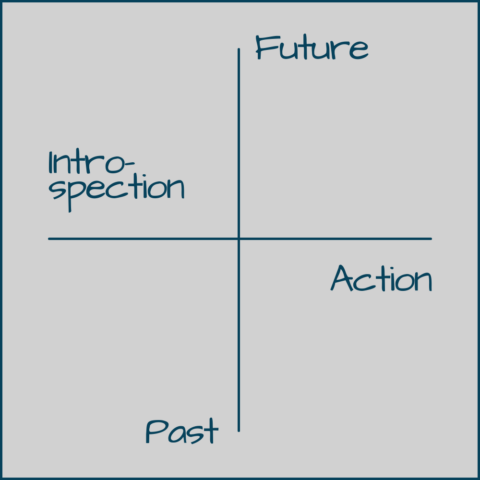
Whether this is your first Yearly Review or you’re a seasoned expert, it can be helpful to look for a template that guides you through all of this. After all, it can be quite hard to assess your life and look for growth opportunities while simultaneously coming up with prompts and questions.
That’s why I decided to turn my own Annual Review for 2022 into a template. You can get it for free at the bottom of this post – or read on to have a look inside.
Your Personal Annual Review Template in Notion
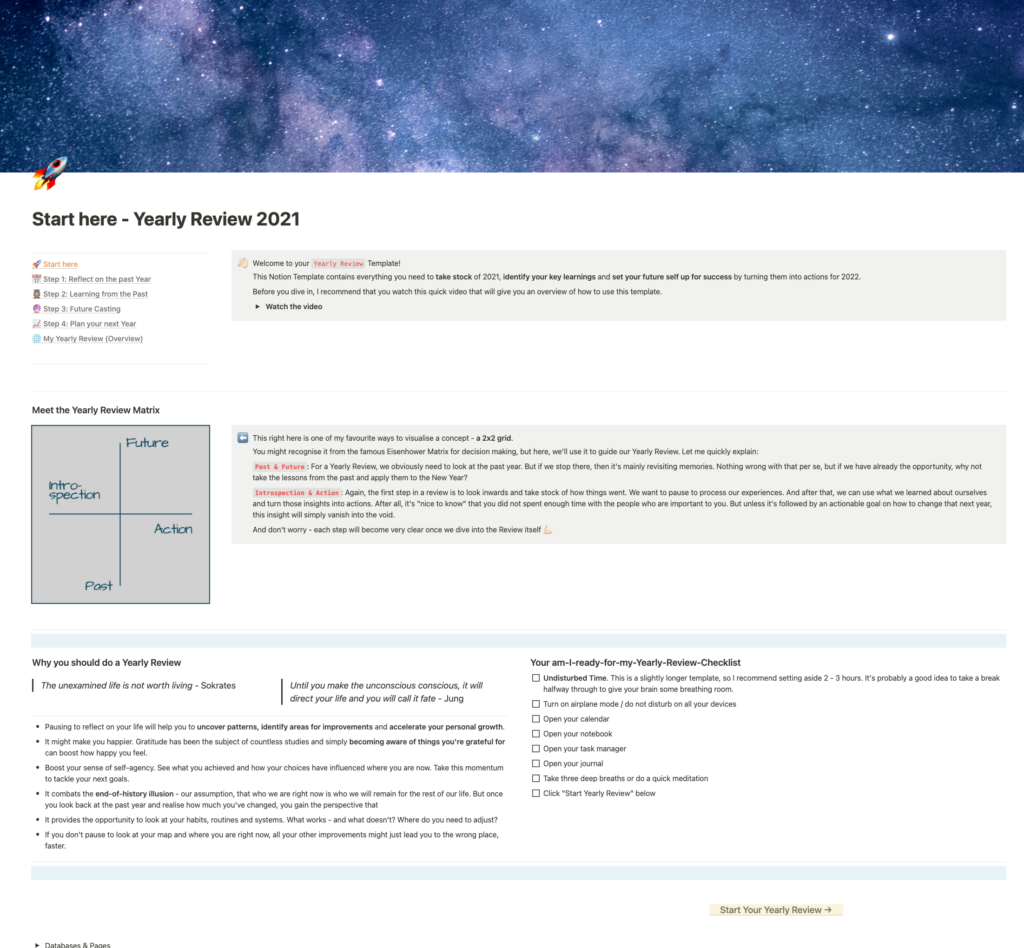
When you open the Notion Template for the first time, you’ll see this Start Page. It includes a video walkthrough of the template as well as some more information on the Annual Review Matrix.
Step 1: Reflect on the Past Year
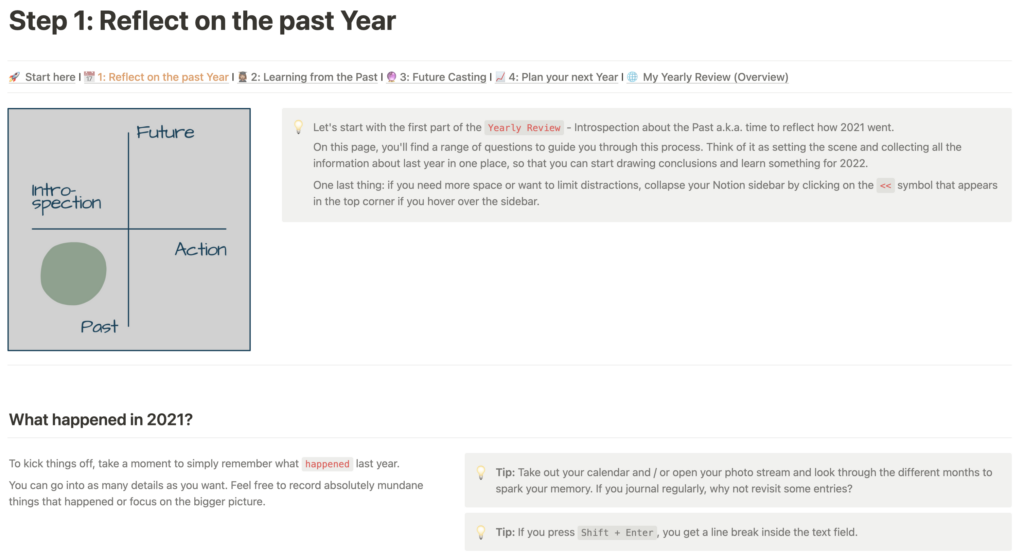
We kick things of with the reflection on the past year. The template comes with a lot of questions to guide you through this process. Step by step, you will
- recap what happened in 2022
- identify which people, experiences, accomplishments and little things you’re grateful for
- dive deeper into last year with questions like “What kept you up at night with excitement?” or “What was an impactful decision this year?”
Step 2: Learning from the Past
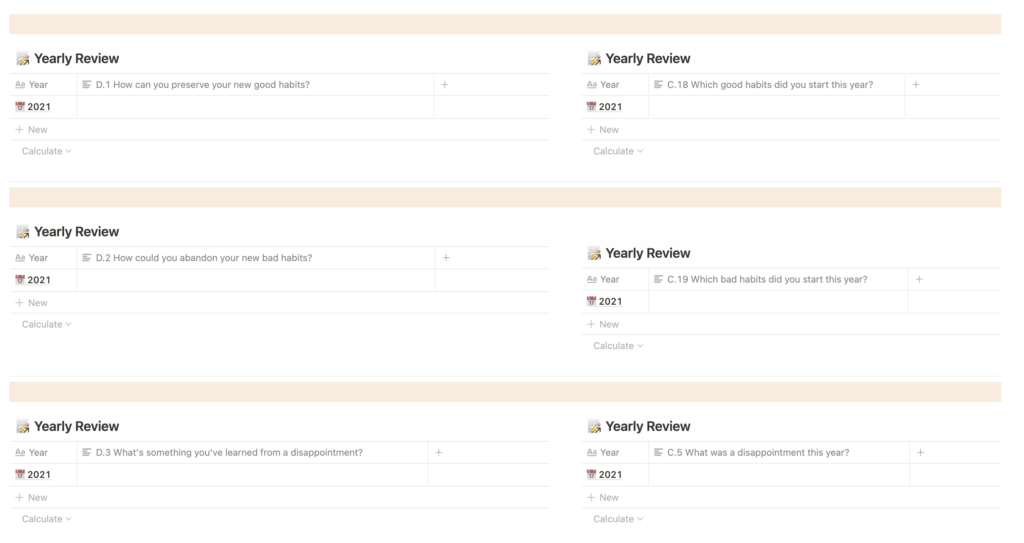
Moving on to the second step, it’s time to build upon our reflection and identify what we can learn from 2022.
Here’s where Notion comes in particularly handy. Instead of just asking you another question in isolation, the Personal Annual Review Template will show you your previous answers in the right context, so that you can quickly draw your conclusions.
Step 3: Future Casting
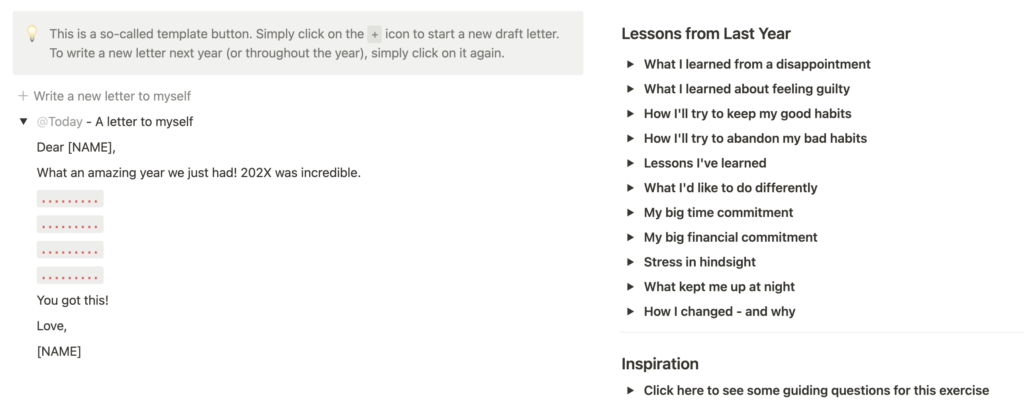
A Personal Annual Review should also prepare us for the next year, so after identifying your key learnings, you’re going to use them to envision how 2023 might look like.
Research has shown that you are more likely to achieve your goals and develop a positive mindset if you visualise your desired outcomes.
Don’t worry if you’ve never done anything like this before. It’s as easy as writing a letter – just that you’re writing it to yourself. Plus, the template comes with a bunch of prompts to get you started.
Step 4: Plan Your Next Year
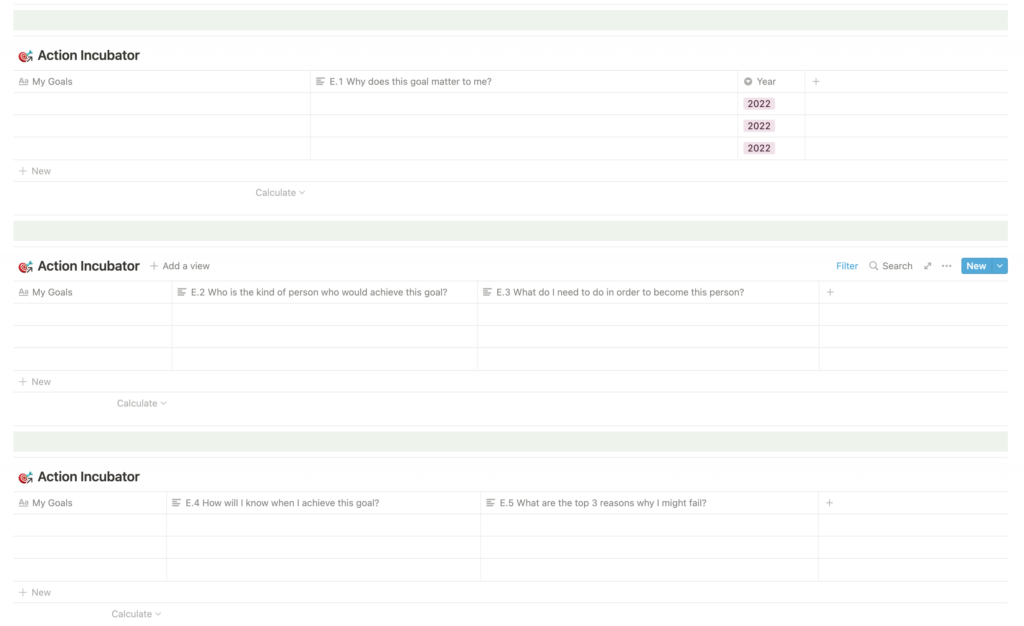
Lastly, you’ll use this visualisation to identify three specific goals for 2023.
And because goal setting alone won’t bring you far if you don’t actively work on implementing a system to create progress, you’ll move your goals through the Action Incubator to make sure you can check these goals off when you do your Annual Review for 2023.
Then, you can use something like my Habit Tracker in Notion to keep yourself accountable throughout the year.
Get Your Annual Review Template in Notion Now
You can download this Notion Template plus another 21+ other free templates here:


